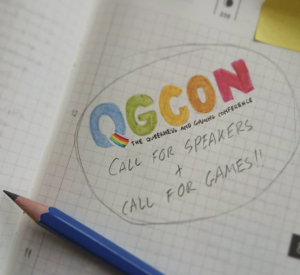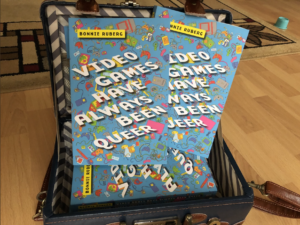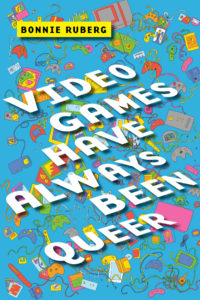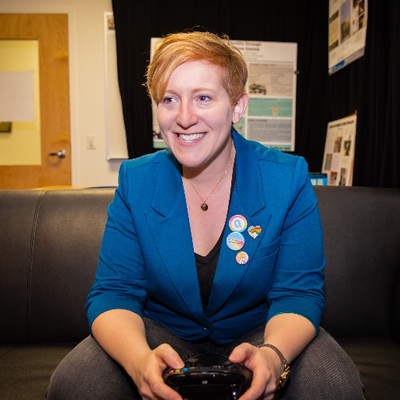Along with some wonderful collaborators here at UC Irvine, I’ve been running a research group that we call the Inclusive Streaming Initiative (@inclusivestream). Its mission is to explore issues of diversity, inclusion, identity, and harassment in video game live streaming. Because of the interests of the group, our focus so far has been on gender and sexuality – especially the experiences of women streamers and the ways that sexuality and embodiment are being used to delegitimize streamers who don’t fit the image of the normative “gamer.”
In just the last couple weeks, our two first peer-reviewed papers from the Inclusive Streaming Initiative have come out — a very exciting start! Here they are, with their abstracts:
– “Nothing but a “Titty Streamer”: Legitimacy, Labor, and the Debate over Women’s Breasts in Video Game Live Streaming,” Bonnie Ruberg, Amanda Cullen, and Kat Brewster, Critical Studies in Media Communication
Since the mid-2010s, live streaming has become an increasingly prominent facet of the cultural and commercial landscape of video games. Twitch, the largest streaming platform, reports that more than two million streamers broadcast on their site monthly. This article addresses gender-based harassment in video game live streaming, a widespread problem, especially for women streamers. Here, we deconstruct the discriminatory discourse that surrounds the bodies of women streamers, with a focus on the term “titty streamer.” “Titty streamer” is a derogatory label applied by detractors to women streamers who are perceived as drawing undeserved attention from viewers by presenting their bodies in sexualized ways. To delineate and critique how this term is being deployed in the cultures that surround Twitch, we perform a qualitative analysis of comments in forum threads in the Twitch subreddit (r/Twitch). Our analysis reveals that the term “titty streamer” is far more than a dismissible, juvenile insult. The term serves as a window onto underlying cultural logics and anxieties from within gamer culture about labor and legitimacy in live streaming, as well as larger issues of how women’s bodies are perceived, performed, and policed in and through video games.
– “Necklines and ‘Naughty Bits’: Constructing and Regulating Bodies in Live Streaming Community Guidelines,” Amanda Cullen and Bonnie Ruberg, Proceedings of the 2019 Foundations of Digital Games Conference
This paper performs a qualitative analysis of the community guidelines of video game live streaming platforms like Twitch, Mixer, and Caffeine. Live streaming is becoming an increasingly prominent part of the contemporary landscape around video games, game cultures, and the games industry. Recent research into video game live streaming has explored its financial structures, its potential as a platform for self-expression, and its novel affordances for communication. However, community guidelines also play a significant, behind-the-scenes role in shaping live streaming practices. These guidelines, which shift over time in response to controversies and changing notions of acceptable behavior, set standards for what types of content can be streamed and how streamers present themselves on-camera. Here we assemble, compare, and interpret the community guidelines of a number of top live streaming sites. Our focus is on how these guidelines construct and regulate “legitimate” bodies – both the bodies of streamers and the bodies of in-game characters – especially the sexualized bodies of women. In varying ways, each set of community guidelines attempts to establish rules for how women’s bodies may or may not be presented on screen. Often these guidelines measure and quantify the body, for example by dictating precisely how high the neckline of a streamer’s shirt must be. Through our analysis, we articulate the unspoken yet active cultural work performed by these community guidelines, which try yet ultimately fail to render a definition of the sexualized body in precise, concrete terms. This research also offers new insights into larger issues of video games and gender. It points toward anxieties about the visibility of women’s bodies in gaming spaces and demonstrates that, although live streaming platforms like Twitch present their community guidelines as tools for protecting their community members, these same guidelines often enact the further marginalization of women and other diverse streamers.

 I’m super excited to be able to share that the annual Queerness and Games Conference (QGCon) is coming back for its 6th year — this time in Montreal at Concordia University on May 23 & 24, 2020. QGCon has been immensely important to me since we started it back in 2013 at Berkeley — when it was just a dream, a scrappy little budget, and a tenacious refusal to be quiet any longer about the importance of queerness and queer people in video games. It’s the best <3.
I’m super excited to be able to share that the annual Queerness and Games Conference (QGCon) is coming back for its 6th year — this time in Montreal at Concordia University on May 23 & 24, 2020. QGCon has been immensely important to me since we started it back in 2013 at Berkeley — when it was just a dream, a scrappy little budget, and a tenacious refusal to be quiet any longer about the importance of queerness and queer people in video games. It’s the best <3.

